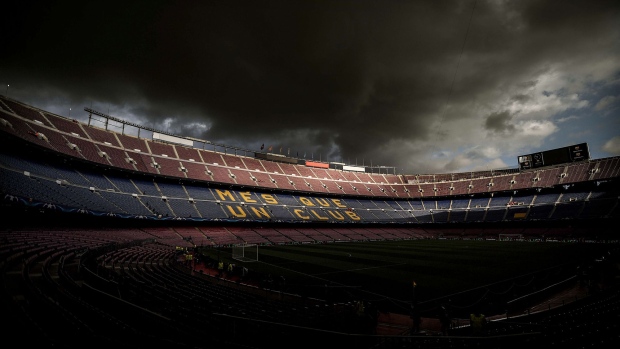Mar 7, 2021
Barcelona Soccer Club Is Getting Caught Up in Politics
, Bloomberg News

(Bloomberg) -- FC Barcelona calls itself “more than a club,” an affirmation that its Catalan culture and identity within Spain goes beyond soccer. That motto could be about to take on wider significance as it gets more deeply embroiled in the nation’s politics.
The biggest club in the world by revenue will hold elections on Sunday to pick a new president. The outcome may have a bearing on the future of Catalonia’s independence movement, whose fight with the Spanish government has dominated the country over the past three years.
Known internationally for stars like Argentina’s Lionel Messi, Barcelona is a flag carrier for Catalonia and was a lightning rod for resistance against the Franco dictatorship. On 17 minutes and 14 seconds at home games—before the pandemic emptied the stadium—a faction of the crowd chants for independence to symbolize the fall of the city in 1714.
But the team is still considered the last big Catalan institution that remains largely outside the influence of secessionists.
During the campaign to elect a new president, candidates have mostly avoided speaking publicly about the Catalan issue. Behind the scenes, though, efforts are being made to ensure that whoever wins will be firmly aligned with the separatist cause, according to a person familiar with the plan.
“In a country where politics is as voracious as it is in Catalonia, where there’s a vengeful and fratricidal behavior in so many things, it’s no surprise that Barca has become a disputed power,” said Ramon Miravitllas, author of the 2013 book called “Barca’s Political Role.” “To those who favor independence, Barca needs to be a striker that plays against other forces beyond football.”
The two main pro-independence parties—Esquerra Republicana and Junts per Catalunya—are currently negotiating to form a government in the region after elections last month. While Esquerra looks set to lead the administration, the more radical Junts appears to have the upper hand in the race for who will run Barcelona.
The party’s leader, former regional President Carles Puigdemont, is personally following every twist and turn of the election. He is in self-proclaimed exile in Belgium following the turmoil of the region’s failed bid for independence in October 2017, which also divided Spanish soccer as well as the nation.
Junts is interested in using Barcelona to develop television content, according to the person familiar with the party’s involvement. The club owns a television channel and has a content studio, Barca Studios, with capacity to build streaming services.
Puigdemont and his allies have been working with Joan Laporta, a former president and the frontrunner to get the post again.
People close to Puigdemont have been helping gather the necessary financial guarantees for candidates on the Laporta team. They need 100 million euros ($119 million)—or about 8.5 million each—and enlisted the help of an executive at one of Catalonia’s main banks, according to the person familiar with the situation.
Should he prevail, Laporta faces the task of fixing a club in a mess, with debt of about 1 billion euros and a cash crunch in May. Former President Josep Maria Bartomeu and three other directors were arrested earlier this week amid a prosecutor’s investigation into the previous administration’s use of the club’s funds.
In December, Laporta made an advertising splash when he put up a billboard outside the stadium of archrival Real Madrid in the Spanish capital. The slogan “Eager to see you again” referenced the rivalry, but the message was also that the independence movement is back, said a person familiar with the decision.
“Barca has been ‘more than a club’ since the dictatorship, but it can’t have the same role,” said Miravitllas. “Times have changed.”
©2021 Bloomberg L.P.







